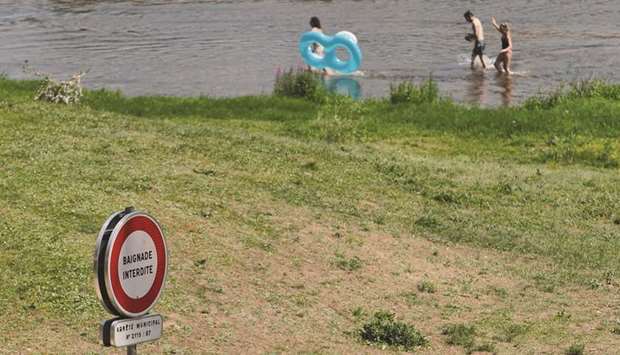France’s national weather service has issued its first heatwave red alert, saying that temperatures in the south of the country could reach a record 45° Celsius today.
Such heat “is dangerous for everyone, and can kill in the case of outdoor physical activity”, national health director Jerome Salomon warned.
He said that some drownings and deaths of people engaged in “intense physical exercise in the sun” have already been recorded but it would be weeks before the full effect on mortality was known.
Yesterday France registered its highest ever temperature for the month of June – 42°C, in the village of Grospierres in the southern Ardeche department, weather service Meteo France said.
The red alert, the highest of three alert levels for dangerous weather, covers the cities of Marseille, Avignon, Montpellier and Nimes and the four surrounding departments.
Seventy-six of the remaining 92 departments in mainland France and Corsica are on orange alert, the second level, Meteo France said.
School sports and physical education would be cancelled in the red alert areas, and parents may keep their children home from school if they prefer, Health Minister Agnes Buzyn announced.
Howeve, Education Minister Jean-Michel Blanquer said most schools are still open, with only 225 out of 54,000 closing where the buildings were unsuited to the weather.
Authorities have also banned the transport of livestock.
French authorities have maintained plans for dealing with very hot weather since a 2003 heatwave that cost 15,000 lives in France and an estimated 70,000 across Europe.
Neighbouring Germany has also seen a record temperature for June this year – 38.6°C on Wednesday in the eastern town of Coschen, on the Polish border.
Yesterday Germany saw a reprieve from the heat, but it was expected to return this weekend with temperatures reaching near 40°C.
Wildfires exacerbated by the hot weather meanwhile hit Spain and Greece.
In northeastern Spain, scores of firefighters fought to contain a wildfire that had already scorched 4,000 hectares in the Catalonia region, Catalan Interior Minister Miquel Buch said.
Near Athens, a refugee camp was evacuated as firefighters backed up by aircraft sought to bring a brush fire under control in bone-dry conditions.
The intense heatwave has led to warnings that action to combat climate change is ever more urgent.
“The heatwaves reaching Europe are proof that climate change is striking everywhere and it is a serious public health threat,” UN Secretary General Antonio Guterres tweeted on Wednesday.
Meanwhile, Paris and several other cities have banned older vehicles from the roads as the heatwave exacerbates air pollution.
Paris has banned more than half of the cars registered in the region from its roads as a record heatwave worsens air pollution, the most drastic restrictions ever imposed there, officials said.
The ban on older and less efficient cars was imposed on Wednesday and is due to stay in place within the A86 second ring-road – which encompasses Paris and 79 towns around it – as long as the hot weather lasts, the city council said.
Data firm AAA Data said that nearly 5mn vehicles registered in the Ile-de-France area around Paris were covered, about 60% of total, a record number to be restricted.
The city was not immediately available to comment on those estimates.
Traffic was lighter in Paris, but not significantly so.
Several drivers said they were ignoring the restrictions as the fines for breaking them – just €68 ($77) for cars and €135 for vans – were so low.
Paris’ driving ban was imposed under the new “Crit’Air” coloured stickers system, which classifies cars by age and pollution levels.
Only electric or hydrogen vehicles, petrol cars registered after January 2006 and diesel cars registered from January 2011 – corresponding to Crit’Air levels 1 and 2 out of 5 – were allowed on the roads.
Car owner lobbies decried the ban, saying it is not efficient to reduce pollution.
“There is a kind of hysteria about pollution. It is a bit over the top,” said motorist federation FFAC’s Julian Constantini.
In the capital, air quality monitor Ming agency Airparif said pollution levels were high, with ozone levels exceeding 180 microgrammes per cubic metre.
Paris is set to tighten regulations further from July 1, when cars with level 4 stickers – cars with diesel engines registered between 2001 and 2005 and trucks from 2006 to 2009 – will be banned permanently within the A86 ring-road area.
Trucks and cars with Crit’Air 5 registration (1997-2000-registered diesels), as well as cars without a sticker have been banned from central Paris since July 2017.
The city council plans to continually tighten regulations until 2030, when only electric or hydrogen-fuelled cars will be allowed on Greater Paris roads.

A sign reads ‘Bathing prohibited’ as people wade through the water of the Loire River in Tours, France.
